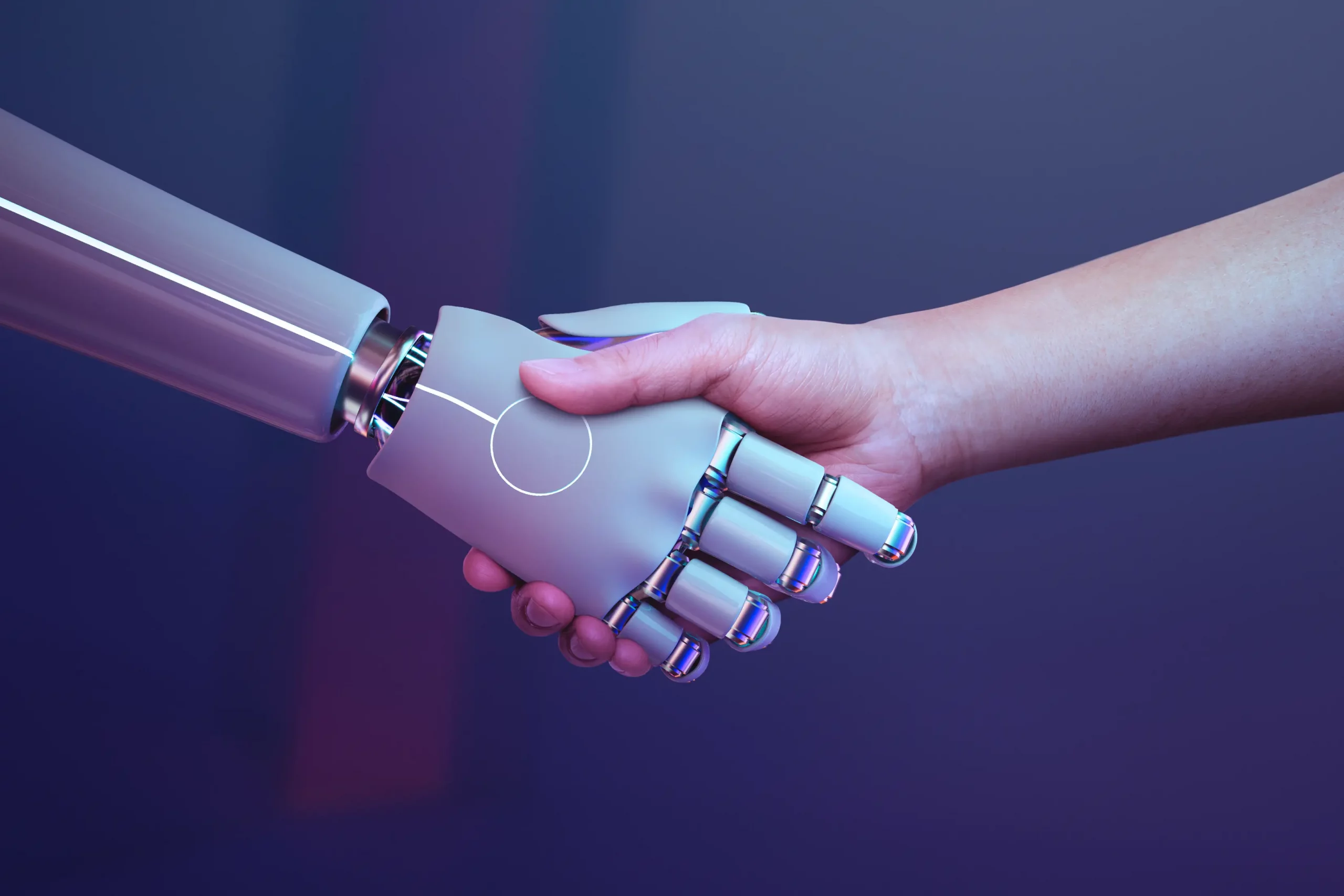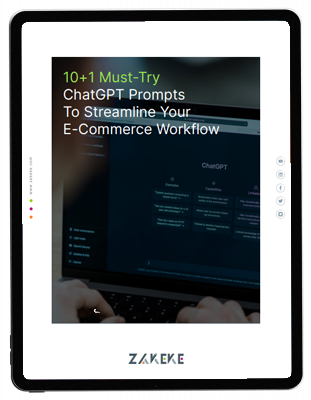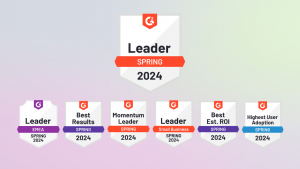Even though AI is becoming increasingly popular, its application to online shopping goes beyond fad status. Improving product searches, creating personalized suggestions, and automating customer assistance are just a few of its many uses. Because AI has grown so rapidly in recent years, it is easy to lose sight of these advantages among all the buzz about the technology.
Here is where we may be of help. The purpose of this guide is to deconstruct the functions, advantages, and uses of AI in online retail. We’ll also review key upcoming trends and top eCommerce AI solutions so you can make the most of AI and turn this tech achievement into measurable company success.
The Importance of AI in Predictive Analytics
Artificial intelligence (AI) is at the core of predictive analytics. AI is necessary to translate raw data into insights that can be put into action for marketing objectives. It is considerably easier for AI algorithms to handle and evaluate enormous data sets than it is for people to do so.
This speed is necessary for marketing because it enables businesses to react quickly to shifting client preferences and trends in the market.
In every marketing activity, hyper-personalization is made possible by predictive analytics driven by artificial intelligence. Artificial intelligence helps firms develop personalized marketing messages and promotions that are more likely to connect with particular customers by evaluating their behavior and preferences.
In addition, robotic intelligence plays a part in predicting. To estimate future trends and consumer behavior, predictive analytics makes use of artificial intelligence.
With this projection power, marketers can manage resources more effectively, successfully plan marketing campaigns, and quickly adjust to changing market conditions.
Why using AI to predict customer trends is a good idea
Businesses that want to stay competitive and improve the customer experience can get a lot out of using Artificial Intelligence (AI) to predict customer trends. These are some of the main benefits:
Anticipating needs
Artificial intelligence (AI) can find weak signs, pain points, and new patterns, which lets you guess what a customer needs before they even say it. This enables businesses to give current and custom solutions ahead of time, which sets them apart from the competition.
Better personalization
AI makes it possible to tailor products, suggestions, and messages more accurately to each customer by guessing their preferences. By learning about each customer’s tastes, businesses can give them more personalized experiences, which makes them more loyal and interested.
AI can help businesses learn a lot about market trends and changes, which can help them improve their goods and services. This information helps change and improve current goods and services, responding to changing customer wants before they happen while also ensuring they remain useful.
Making strategic decisions
Predictions based on AI give us helpful information for making strategic decisions.
Companies can plan, sell, and make new products that meet customer needs and take advantage of new possibilities if they know what trends are coming up.
Competitive advantage
Companies can become innovative in their field by using AI to predict customer trends, which gives them a competitive edge.
This helps them stand out from competitors and stay ahead of them by giving customers unique experiences and anticipating their changing needs.
How AI is reshaping the industry
Artificial intelligence (AI) is providing companies with the ability to provide more customized experiences, simplify processes, and drive development, which is altering the e-commerce sector.
It is anticipated that the effect of artificial intelligence on e-commerce will increase as it continues to develop, therefore influencing the future of online purchasing in a variety of interesting ways.
The impact of AI on eCommerce
A few things may come to mind when we mention artificial intelligence (AI), such as autonomous robots that are efficient, self-driving automobiles, or smart personal assistants like Siri and Alexa.
Artificial intelligence, however, reduces to nothing more than computer programs that may deceive the human brain.
Included in this are learning, also known as the process of collecting information and the rules for applying it, reasoning (the process of using these rules to arrive at precise or approximate conclusions), and self-correction.
As a result of the present digital growth and the change in customer buying habits, an increasing number of companies are using AI to efficiently adapt to market changes and maintain a competitive advantage.
E-commerce businesses may benefit from AI since it automates procedures, allows for more tailored consumer experiences, and helps with making choices based on data. E-commerce sites may now use AI to personalize product recommendations to shoppers according to their tastes and interests, as well as previous purchases and search terms.
Additionally, companies may provide modern customer assistance with minimal human involvement due to AI chatbots that automate e-commerce and customer care. By stepping in when a consumer has a question or problem, these AI-based technologies may help save time and money, which might result in happy customers.
How AI is used in E-commerce
AI gives stores a lot of ways to improve their business and the customer experience by figuring out trends and making predictions based on data. Let’s look at some of the most important ways AI is used in e-commerce.
Personalization and suggestions for products
One important use of AI in online shopping is personalization. By making personalized product suggestions, AI-powered systems can make the customer experience a lot better. These systems can figure out what a customer might be interested in by looking at their past purchases and how they behave while shopping. The chance of the consumer making a purchase increases as a result.
Better search options
AI can make search functions on e-commerce sites much better. To make search results more accurate and valuable, AI processes actual words and recognizes photos. People can even look for goods visually and get results close to their posts. AI can help you even further by utilizing advanced image-generation techniques. With an AI image generator, you can create a multitude of images tailored to your specifications, enhancing the visual appeal and diversity of your content effortlessly.
Improving product listings
AI systems can be beneficial in making product descriptions better. Businesses can use creative AI writing tools like AI Humanizer to write unique product descriptions that are good for SEO automatically. Not only does this save a lot of time, but it also helps your search engine rankings.
Strategies for changing prices
With AI, stores can set prices that change based on things like demand, prices from competitors, and how customers behave. AI programs can help you change prices in real-time to get the best sales and profits.
AI for customer service
Multiple applications appear for AI in customer service. For starters, AI-driven robots can answer simple customer questions, freeing human workers to handle more complicated problems.
AI-powered tools can also help workers by giving them information about customers and the best ways to help them during a support call. AI is a significant component of improving customer service because it automatically tags, sends, and suggests answers.
Data analysis and customer behavior research
AI tools simplify sorting through huge amounts of customer data to learn more about their shopping habits and interests. These results can help businesses with everything from product development to marketing efforts.
AI can also automatically report and analyze data, which helps companies track key success indicators.
Supply Chain Optimization
Artificial intelligence assists e-commerce companies in improving their supply chain operations by anticipating demand, monitoring inventory levels, and optimizing logistics.
AI has the potential to cut costs, improve productivity, and guarantee timely delivery of items to clients due to its ability to automate these procedures.
What AI will do in the future for online shopping
AI is becoming more and more important in e-commerce, and this trend is going to continue. Based on major trends, AI is expected to continue to make buying more personalized.
Also, more companies will probably use AI to find and understand customer problems more quickly and correctly. It might be possible to use natural language processing to find unhappy customers, important issues, or specific product complaints in huge amounts of customer contacts.
As AI continues to make its mark, you can get your e-commerce business ready by learning how to use AI without losing the personal touch that is important to your customers.
Wrapping It Up
With the growing use of AI, it’s especially important to remember that technology can only supplement human interaction; it cannot replace it. With the help of AI, your consumers should have a better experience that is more customized to their needs, more efficient, and, in the end, profitable for both your company and your customers.

Divyesh Bhatasana
Founder of @Jeenam
Divyesh Bhatasana, the visionary Founder of Founder @ Jeenam | SaaS Link Building agency, leads the charge in the world of link building. With a reputation for excellence, he has earned the trust of 50+ brands. His expertise lies in delivering premium link building solutions tailored for SaaS companies, driving their success to new heights.













